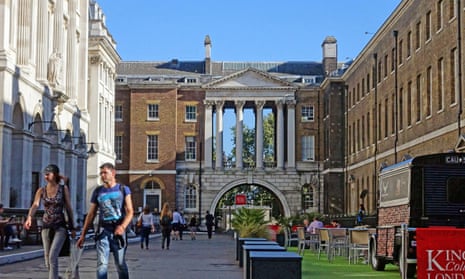King’s College London has become one of the latest UK institutions to sever all ties with the Sackler family amid outrage over its role in the deadly opioids epidemic in the US.
Several other UK organisations that have recently been funded by Sackler cash, including the Royal Opera House, continue to take active steps to distance themselves from the family and expunge all records of their previous ties.
King’s said it planned to change the name of its Sackler Institute on developmental brain disorders because it no longer receives money from the family’s charitable foundations.
In 2021 the college accepted £750,000 from the Dr Mortimer and Theresa Sackler Foundation, which helps fund 22 doctoral research students. King’s confirmed to the Guardian that this was the last grant from the family.
In a statement it said: “King’s College London and the Dr Mortimer and Theresa Sackler Foundation have mutually agreed that, as funding has now ended, the research the foundation supported will no longer carry the Sackler name.”
The move comes after Oxford University confirmed this week that it was also ending its lucrative funding arrangements with the Sackler family and removing its name from buildings, galleries and positions funded through their donations.
Members of the Sackler family are the owners of Purdue Pharma, which reached a multibillion-dollar bankruptcy settlement over its role in an epidemic that is estimated to have killed more 500,000 people since 1999. It was accused of aggressively marketing OxyContin and playing down its addictiveness.
The family’s other UK-based charity, the Sackler Trust, currently highlights its support for 17 UK organisations on its website. All have been contacted by the Guardian to clarify if they are still accepting Sackler cash. Thirteen responded and said they had now cut ties with the trust. At least three of the charities listed – Ballet Black, the Prison Education Trust and the Spitalfield Crypt Trust – have asked the Sackler Trust to remove their name from their websites.
In a statement Ballet Black said it had made a decision in April last year not to seek or accept any more money from the Sackler family “in light of its proven involvement in the opioid crisis in the USA”.
It added: “We have also written to the Sackler Foundation to ask them to remove Ballet Black from the website and any other materials.”
On Friday the Royal Opera House (ROH) removed from its website the name of Dame Theresa Sackler, a former board member of Purdue who is identified in several US lawsuits, who on Thursday had been listed as a honorary director.
In a statement a spokesperson said: “The ROH no longer receives support from the Sackler Foundation, and will not be accepting support in the future. All donations and philanthropy received is assessed through the board of the ROH’s donation and income acceptance committee and is kept under constant review. We have historically received support from the Sackler Trust and Dame Theresa Sackler, which is why they were referenced in this way on our website.”
The Royal Botanic Gardens, Kew, confirmed that last year it had changed the name of its 2006 Sackler crossing, a 70-metre winding path across a waterway, to the Lake crossing.
In a statement, a spokesperson said the decision was “based on feedback from members, donors, visitors and staff over time and following meetings with our board of trustees and the Sackler family”. She added: “We have not accepted funds from the Sacklers since 2016 and have no plans to make any requests for funding in the future.”
Chris Garrard, a co-director of the campaign Culture Unstained, said: “With King’s College now severing its ties to the tarnished Sackler name, it has joined a near wholesale rejection of the family’s toxic philanthropy in the UK, one that has unfolded over just a few years as Nan Goldin and others shone a spotlight on the harmful ways Purdue’s profits were made.
He added: “The days where a museum or gallery might simply ‘take the money and run’ are over. Whether it is dirty money from the Sacklers or cynical sponsorship from fossil fuel companies, numerous cultural and educational organisations are now stepping up and showing that it is possible to draw an ethical red line and reject funds from those that do not share their values.”
The Sackler Trust has been approached for comment.








